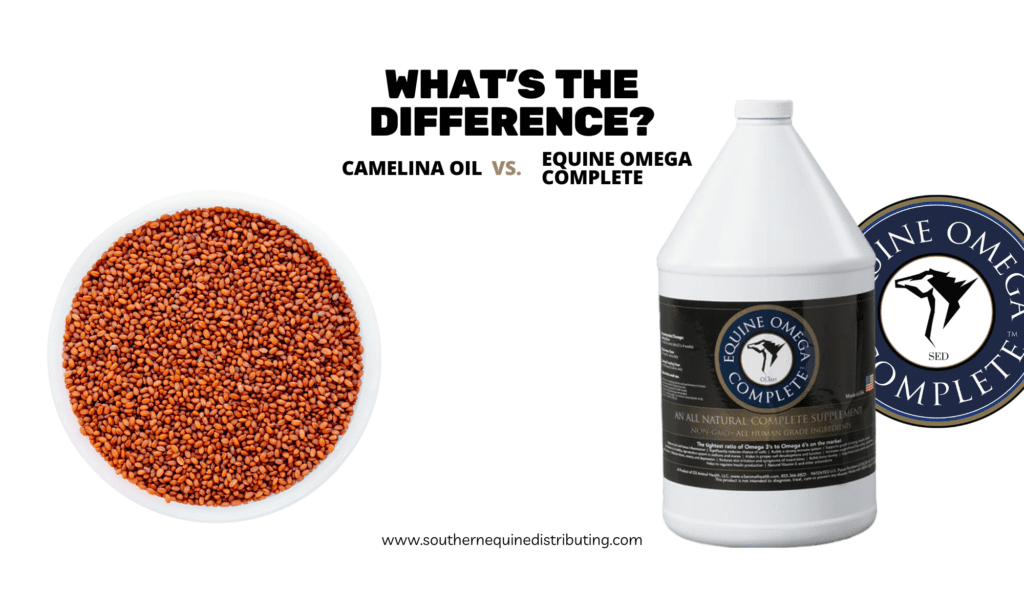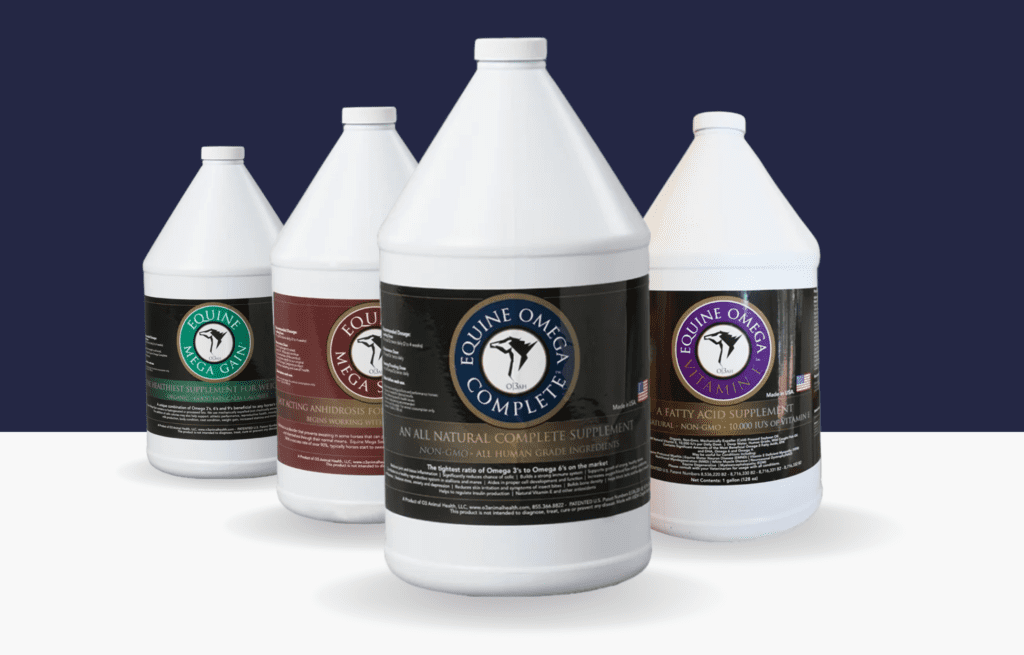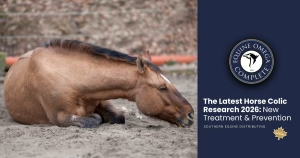Introduction
When it comes to equine health, horse owners are continually seeking effective and reliable supplements to support their companions’ well-being. Two prominent contenders in this realm are camelina oil and Equine Omega Complete. Both supplements are recognized for their omega-3 fatty acid content, but they vary in ways that can impact their effectiveness in promoting equine health. This article will delve into the attributes, advantages, and distinct qualities of camelina oil and Equine Omega Complete, assisting horse owners in making an informed decision for their equine partners.
A Quick Lesson on Omega Fatty Acids
Omega-3s are essential nutrients that occur in different forms: ALA, EPA, and DHA.
Alpha-linoleic acid (ALA) is an essential omega-3 that is a precursor to eicosapentaenoic acid (EPA) and docosahexaenoic acid (DHA), which are long-chain fatty acids essential for various physiological processes in horses, including reducing inflammation, supporting immune function, and promoting healthy skin and coat.
EPA is renowned for its anti-inflammatory properties, which can be particularly beneficial for horses dealing with joint pain, allergies, or skin conditions. By modulating the body’s inflammatory responses, EPA helps reduce inflammation, relieves discomfort and supports the body’s natural healing processes.
DHA is another critical omega-3 fatty acid with significant cognitive benefits. It plays a crucial role in brain health and development, making it essential for horses of all ages.
Omega-3s in Action: Why All-Around Supplementation Matters
It’s very likely that you’ve heard of all kinds of supplements that claim to support the health and well-being of horses (and dogs). And while many supplements often contain a mix of vitamins and minerals, camelina oil is best known as a stand-alone ingredient that provides horses with the essential Omega-3 fatty acid “ALA” and Vitamin E. EOC, on the other hand, is a patented blend of wild-caught fish oil, soybean oil, and human-grade vitamin E.
What really is the difference?
A comparison of camelina oil for horses and Equine Omega Complete
Camelina Oil: Rich in ALA
Derived from the seeds of the Camelina sativa plant, camelina oil has gained attention as a potential nutritional supplement for horses. This oil is naturally rich in alpha-linolenic acid (ALA) but does not have the other two essential fatty acids EPA and DHA.
Camelina oil also contains naturally occuring vitamin E, an antioxidant that contributes to overall health by protecting cells from oxidative stress. Benefits associated with camelina oil include supporting skin and coat health, promoting immune function, and providing a source of dietary fat.
Equine Omega Complete: Rich in ALA, EPA, and DHA
Equine Omega Complete is a unique formulation that combines omega-3 and omega-6 fatty acids from wild-caught fish oil and non-GMO soybean oil. The result is a powerful supplement that supports joint health, skin and coat condition, immune function, and overall vitality.
At the heart of Equine Omega Complete are omega-3 fatty acids in three different variations: ALA, EPA, and DHA.
Bioavailability
When it comes to effective supplementation to yield the maximum benefits, it all boils down to bioavailability,
The conversion of ALA to EPA and DHA in the body is limited; research shows that the overall conversion rate of ALA to EPA is approximately 10%, and the conversion to DHA is even lower, at less than 0.1%.
This means that feeding camelina oil alone will not provide your horse with essential omega-3 fatty acids EPA and DHA.
Direct supplementation of EPA and DHA is much more effective and should be preferred for maximum benefits.
While horses need different forms of omega fatty acids, it is a well-known fact that horses specifically need EPA and DHA to experience the benefits omega-3.
Further Reading
Health Benefits
Companies that manufacture and sell camelina oil for horses often point to improved coat condition, reduced allergic reactions, improved digestion, and reduced inflammation causing discomfort in joints; however, these results are not unique to camelina oil. The same benefits are reported in products containing the converted forms of omega-3 DHA and EPA, meaning that the benefits of these products are similar, and the overall quality is much higher.
Comprehensive Support
Equine Omega Complete offers holistic support for equine health. Its carefully balanced blend of omega-3 and omega-6 fatty acids addresses multiple systems, ensuring overall well-being. From joint mobility to immune function and skin health, Equine Omega Complete provides a comprehensive approach to equine supplementation.
Quality and Purity
Equine Omega Complete is formulated using premium ingredients, including wild-caught fish oil and non-GMO soybean oil. This dedication to quality ensures that horses receive the best possible nutritional support without compromising on ingredient integrity.
EOC: The Right Choice
While camelina oil presents its own benefits, Equine Omega Complete emerges as the superior choice for comprehensive equine health support. With its focus on active EPA and DHA, efficient bioavailability, and a holistic approach to well-being, Equine Omega Complete ensures that your equine companion receives top-tier supplementation.
As responsible horse owners, it’s paramount to choose a supplement that caters to your horse’s specific needs. Equine Omega Complete not only provides omega-3 fatty acids but also offers a range of essential nutrients that contribute to joint health, immune function, and overall vitality. By opting for Equine Omega Complete, you’re making a proactive investment in your horse’s health and quality of life, providing them with optimal support they truly deserve.






